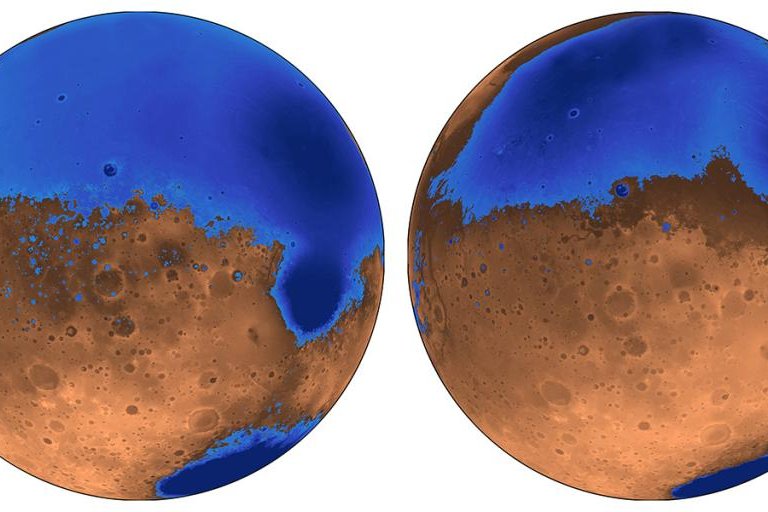Mars' two oceans formed 4 million and 3.6 million years ago, new research suggests. Photo by Robert Citron/UC Berkeley
March 19 (UPI) -- New research suggests oceans first formed on Mars earlier and were significantly shallower than previously predicted. The new findings also highlight the important role volcanic activity played in shaping the formation and evolution of Mars' oceans.
There is plenty of evidence that water existed in abundance on early Mars, but not everyone is convinced that the Red Planet hosted oceans.
If Mars did feature oceans, where did all the water go?
Neither Mars' polar ice caps nor the amount of permafrost estimated to be hidden underground can account of the large volumes of missing ocean water. And planetary scientists say the oceans couldn't have formed and evaporated in less than 4 million years.
According to researchers at the University of California, Berkeley, there may not actually be a discrepancy to explain away. In a new study, published this week in the journal Nature, scientists argue Mars' oceans were much shallower than the Red Planet's topography suggests.
Researchers developed a much more cohesive model for early geologic evolution on Mars by shifting around the timing of major events, specifically the formation of Tharsis, Mars' largest volcanic feature.
"The assumption was that Tharsis formed quickly and early, rather than gradually, and that the oceans came later," Michael Manga, professor of earth and planetary science at Berkeley, said in a news release. "We're saying that the oceans predate and accompany the lava outpourings that made Tharsis."
Scientists have overestimated the size and depth of Mars' oceans, Manga and his colleagues argue. When the oceans formed, the new model predicts, Tharsis was still rather small and had not significantly deformed the Martian surface. Thus, Mars' seabeds were smaller and shallower.
Researchers have previously cited Mars' irregular shoreline as further proof that oceans never existed on the Red Planet. If Mars' earliest oceans formed prior to Tharsis development, however, the evolution of the volcanic system can explain shoreline irregularities.
"These shorelines could have been emplaced by a large body of liquid water that existed before and during the emplacement of Tharsis, instead of afterwards," said Robert Citron, a Berkeley graduate student.
The new models of ocean formation on Mars suggest Tharsis and its development strongly influenced the Red Planet's watery past. The volcano's release and greenhouse gases likely created a warmer climate, allowing water to exist in liquid form. Eruptions also likely created cavities through which water could flow to the surface.
By no means is the new explanation for Mars' oceans a certainty, but the new theory offers scientists new ideas to test.
"This is a hypothesis," Manga said. "But scientists can do more precise dating of Tharsis and the shorelines to see if it holds up."
NASA's InSight mission lander, which is scheduled for launch in May, could help scientists hone in on the precise timing of Mars' early oceans.















